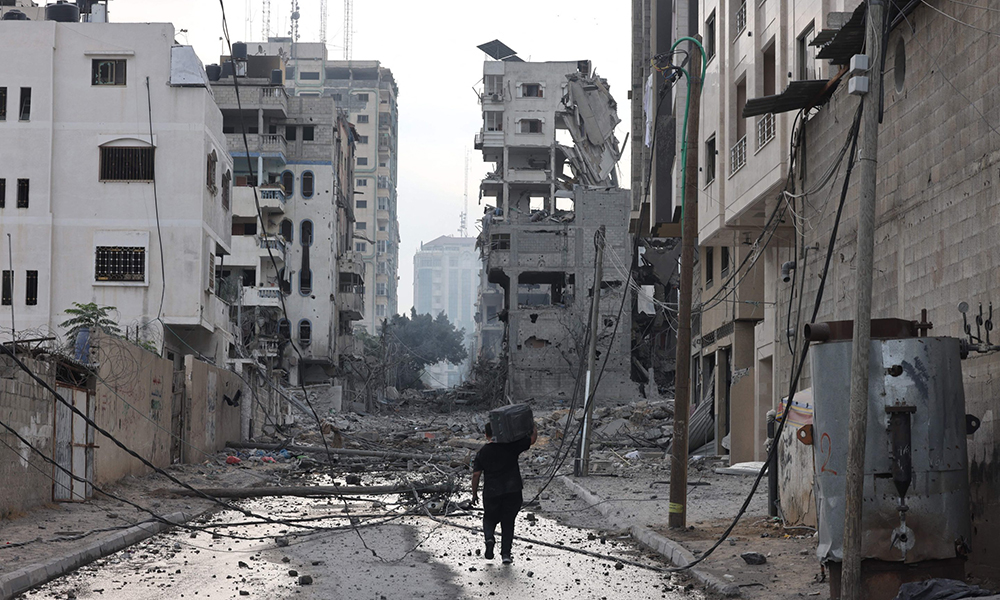
以色列与哈马斯之间的冲突,唤起了人们对1973年“赎罪日战争”引发的石油危机的回忆。德意志银行(Deutsche Bank)的策略师本周甚至发出警告,随着中东事态持续升级,全世界像上世纪70年代一样发生滞胀的可能性越来越高。所谓滞胀是指低增长和高通胀的可怕组合。
然而,标普全球(S&P Global)副董事长丹尼尔·耶金在接受美国消费者新闻与商业频道(CNBC)采访时表示,历史不会重演。这位石油行业专家强调:“尽管人们纷纷联想到1973年的石油危机,但这一次的情况截然不同。”
耶金是一位曾获普利策奖殊荣的作家,他出版了多部涵盖能源市场的著作。他认为,包括沙特在内的海湾地区主要石油生产国仍然希望与以色列建立“建设性的关系”。他指出,这意味着以色列与哈马斯目前的冲突构成一种“地缘政治风险”,短期内可能导致油价上涨,但这并不意味着会像上世纪70年代那样爆发全面的石油危机。在那次危机中,买油的人们在街头排起了长龙。
上周一,以色列战争爆发后,油价暴涨4.2%,达到每桶88.15美元,到周二下午,国际基准布伦特原油价格下跌0.74%,降至87.50美元。
约50年前,以色列与以埃及和叙利亚为首的多个阿拉伯国家,在西奈半岛和戈兰高地发生领土争夺战,1967年,这两个地区被以色列占领。美国在冲突中决定支持以色列,最终导致了石油禁运和阿拉伯石油输出国组织(Organization of Arab Petroleum Exporting Countries,OAPEC)减产,导致油价在几个月内暴涨300%。
但耶金并不认为此次油价会大幅上涨,主要是因为原油市场的供需状况与当时截然不同。他指出,2023年,即使在石油钻井数量减少的情况下,美国原油产量仍在持续增长。美国能源信息署(Energy Information Administration)的最新数据显示,7月,美国原油产量同比增长了近10%,达到每天1,290万桶。
耶金解释称:“今年,非欧佩克+产油国的石油产量增长基本超过了[石油]需求增长。”他认为,除非中东发生更大规模的冲突,否则当前的石油需求无法支持更高的油价。
澳大利亚投行麦格里(Macquarie)的经济学主管大卫·多伊尔在接受《财富》杂志采访时,对耶伦的说法表示认同。他表示上世纪70年代的危机预计不会重演。麦格里管理的资产规模超过5,500亿美元。
他说道:“目前,只要冲突不超出局部冲突的范围,就不会对我们的[全球经济增长]前景产生严重影响。”他认为,目前油价上涨只会“在边缘”对通胀产生适度的影响。
他补充道:“我认为,除非冲突升级成区域性冲突,才会产生更严重的影响,然后你会看到更严重的后果。”
巨大风险
1973年的石油危机显然不太可能再次发生,但如果以色列与哈马斯的冲突升级,历史重演并非不可能。标普全球的耶金在接受CNBC采访时表示:“一个重要的问题是,冲突是否牵涉到伊朗?”
这位石油业专家担心,如果伊朗卷入发生在以色列发生的冲突,美国可能会进一步加强对伊朗的制裁。尽管伊朗的石油产量仅占全球石油供应的约4%,但在欧佩克+减产协议后,伊朗一直在增加原油出口。据路透社报道,今年8月,伊朗日产石油达到315万桶,创下自2018年以来的最高水平。
因此,在线银行瑞讯银行(Swissquote)的高级分析师伊派克·奥兹卡戴斯卡亚表示:“伊朗与以色列进而与美国的紧张关系升级,可能对全球石油产量造成严重后果。”
虽然中东事态升级可能影响伊朗的原油供应,但全球能源市场面临的真正威胁是美国或其他西方国家的油轮遭到攻击。
耶金总结指出:“显然,如果伊朗牵涉其中,风险将大幅上升。问题在于,美国是否会进一步加强对伊朗石油的制裁,以及伊朗是否会扣押油轮作为回应?但现在讨论这些问题还为时尚早。”(财富中文网)
翻译:刘进龙
审校:汪皓
以色列与哈马斯之间的冲突,唤起了人们对1973年“赎罪日战争”引发的石油危机的回忆。德意志银行(Deutsche Bank)的策略师本周甚至发出警告,随着中东事态持续升级,全世界像上世纪70年代一样发生滞胀的可能性越来越高。所谓滞胀是指低增长和高通胀的可怕组合。
然而,标普全球(S&P Global)副董事长丹尼尔·耶金在接受美国消费者新闻与商业频道(CNBC)采访时表示,历史不会重演。这位石油行业专家强调:“尽管人们纷纷联想到1973年的石油危机,但这一次的情况截然不同。”
耶金是一位曾获普利策奖殊荣的作家,他出版了多部涵盖能源市场的著作。他认为,包括沙特在内的海湾地区主要石油生产国仍然希望与以色列建立“建设性的关系”。他指出,这意味着以色列与哈马斯目前的冲突构成一种“地缘政治风险”,短期内可能导致油价上涨,但这并不意味着会像上世纪70年代那样爆发全面的石油危机。在那次危机中,买油的人们在街头排起了长龙。
上周一,以色列战争爆发后,油价暴涨4.2%,达到每桶88.15美元,到周二下午,国际基准布伦特原油价格下跌0.74%,降至87.50美元。
约50年前,以色列与以埃及和叙利亚为首的多个阿拉伯国家,在西奈半岛和戈兰高地发生领土争夺战,1967年,这两个地区被以色列占领。美国在冲突中决定支持以色列,最终导致了石油禁运和阿拉伯石油输出国组织(Organization of Arab Petroleum Exporting Countries,OAPEC)减产,导致油价在几个月内暴涨300%。
但耶金并不认为此次油价会大幅上涨,主要是因为原油市场的供需状况与当时截然不同。他指出,2023年,即使在石油钻井数量减少的情况下,美国原油产量仍在持续增长。美国能源信息署(Energy Information Administration)的最新数据显示,7月,美国原油产量同比增长了近10%,达到每天1,290万桶。
耶金解释称:“今年,非欧佩克+产油国的石油产量增长基本超过了[石油]需求增长。”他认为,除非中东发生更大规模的冲突,否则当前的石油需求无法支持更高的油价。
澳大利亚投行麦格里(Macquarie)的经济学主管大卫·多伊尔在接受《财富》杂志采访时,对耶伦的说法表示认同。他表示上世纪70年代的危机预计不会重演。麦格里管理的资产规模超过5,500亿美元。
他说道:“目前,只要冲突不超出局部冲突的范围,就不会对我们的[全球经济增长]前景产生严重影响。”他认为,目前油价上涨只会“在边缘”对通胀产生适度的影响。
他补充道:“我认为,除非冲突升级成区域性冲突,才会产生更严重的影响,然后你会看到更严重的后果。”
巨大风险
1973年的石油危机显然不太可能再次发生,但如果以色列与哈马斯的冲突升级,历史重演并非不可能。标普全球的耶金在接受CNBC采访时表示:“一个重要的问题是,冲突是否牵涉到伊朗?”
这位石油业专家担心,如果伊朗卷入发生在以色列发生的冲突,美国可能会进一步加强对伊朗的制裁。尽管伊朗的石油产量仅占全球石油供应的约4%,但在欧佩克+减产协议后,伊朗一直在增加原油出口。据路透社报道,今年8月,伊朗日产石油达到315万桶,创下自2018年以来的最高水平。
因此,在线银行瑞讯银行(Swissquote)的高级分析师伊派克·奥兹卡戴斯卡亚表示:“伊朗与以色列进而与美国的紧张关系升级,可能对全球石油产量造成严重后果。”
虽然中东事态升级可能影响伊朗的原油供应,但全球能源市场面临的真正威胁是美国或其他西方国家的油轮遭到攻击。
耶金总结指出:“显然,如果伊朗牵涉其中,风险将大幅上升。问题在于,美国是否会进一步加强对伊朗石油的制裁,以及伊朗是否会扣押油轮作为回应?但现在讨论这些问题还为时尚早。”(财富中文网)
翻译:刘进龙
审校:汪皓
The Israel-Hamas conflict has revived memories of the Yom Kippur War that sparked the 1973 oil crisis. Deutsche Bank’s strategists even warned this week that the odds of 1970s-style stagflation—a toxic combination of low growth and high inflation—are increasing around the world amid the escalating war in the Middle East.
But Daniel Yergin, vice chairman of S&P Global, told CNBC Tuesday that he doesn’t believe history is repeating itself. “Everybody looks back at the oil crisis of 1973, but this is so different,” the oil guru said.
Yergin, a Pulitzer Prize–winning author of multiple books on the energy markets, argued that the major oil producers in the gulf, including Saudi Arabia, still want a “constructive relationship” with Israel. That means the ongoing Israel-Hamas conflict is a “geopolitical risk” that could increase the price of oil somewhat in the near term, he said, but it’s not the harbinger of a full-on oil crisis like the lines-around-the-block 1970s.
After surging 4.2% to $88.15 per barrel Monday in response to the war in Israel, international benchmark Brent crude prices fell 0.74% to $87.50 by Tuesday afternoon.
Some 50 years ago, Israel and a coalition of Arab states led by Egypt and Syria fought over territory in the Sinai Peninsula and the Golan Heights, which were occupied by Israel in 1967. The U.S.’s decision to back Israel in the conflict ultimately led to an oil embargo and production cuts from the Organization of Arab Petroleum Exporting Countries (OAPEC), which caused the price of oil to surge 300% in a matter of months.
But Yergin doesn’t believe oil prices will spike so dramatically this time, largely because the supply-and-demand dynamics in the crude market are far different now. He noted that U.S. crude production has continued to surge in 2023, even with a declining oil rig count. The Energy Information Administration’s latest data shows that U.S. crude oil production rose nearly 10% from a year ago in July to 12.9 million barrels per day.
“Basically, non-OPEC+ oil, the growth in that this year, is greater than the growth in [oil] demand,” Yergin explained, arguing that current demand for oil won’t be able to support higher prices, barring a much more major conflict in the Middle East.
David Doyle, head of economics at Macquarie, an Australian investment bank with over $550 billion in assets under management, echoed Yergin’s comments in an interview with Fortune Tuesday, saying that he doesn’t expect a repeat of the 1970s.
“At this point, as long as it doesn’t broaden out beyond the more local conflict, I have a hard time seeing this having a significant impact on our [global economic growth] outlook,” he said, arguing there will only be a mild impact “at the margin” on inflation from rising oil prices for now.
“I think in order for there to be a more significant impact, you would need to see the conflict escalate into a more regional conflict and then you could see more significant ramifications flowing from that,” he added.
The big risk
A repeat of the 1973 oil crisis clearly isn’t currently under way, but that outcome still isn’t out of the realm of possibilities if the Israel-Hamas conflict escalates. “The big question is, will it involve Iran?” S&P Global’s Yergin told CNBC Tuesday.
The oil guru fears that if Iran gets involved in the conflict in Israel, the U.S. might increase its sanctions against the nation. Iran produces only around 4% of the world’s oil supply, but the country has been increasing its crude exports at a time when OPEC+ has cut its output. Iran produced 3.15 million barrels of oil per day in August, the most since 2018, Reuters reported.
As a result: “An escalation of tensions between Iran and Israel, hence the U.S., could have severe consequences for global oil production,” Ipek Ozkardeskyay, a senior analyst at the online bank Swissquote, said Tuesday.
And while crude supply out of Iran could be affected if tensions in the Middle East escalate, the real threat to the global energy markets may be attacks on U.S. or other Western oil tankers.
“Obviously, if Iran is involved, that raises the stakes. The question then is, does the U.S. tighten sanctions on Iranian oil and does Iran respond by seizing tankers? But we’re not there yet,” Yergin concluded.






